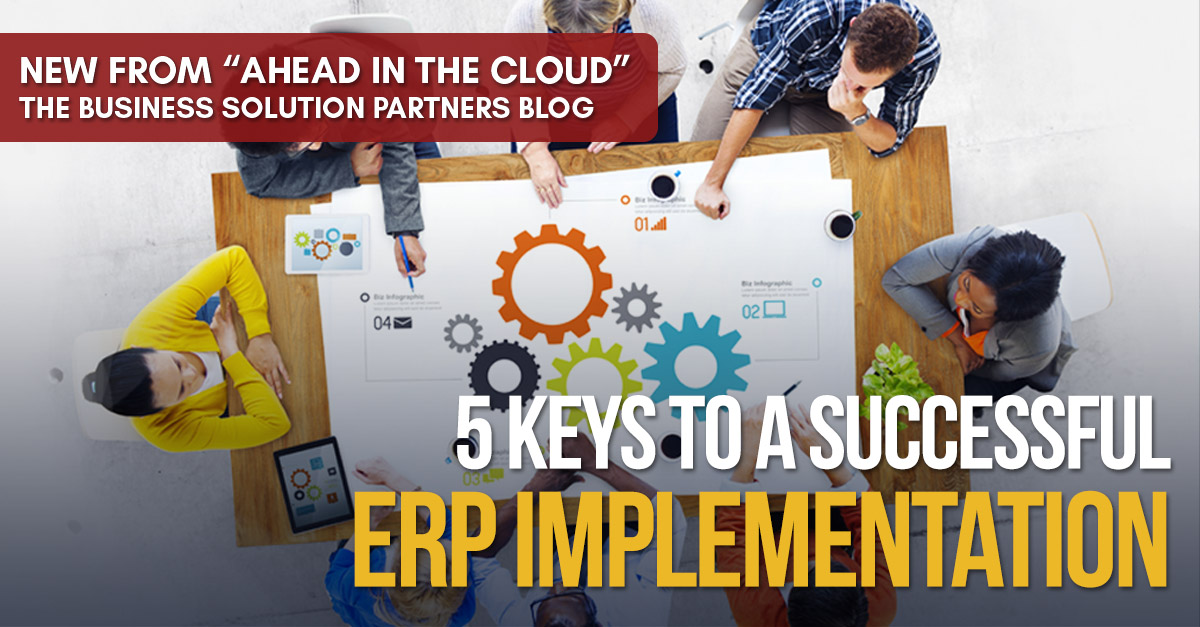Are You Prepared for Your ERP Implementation?
Most firms, especially small and midsized companies, have a goal of growing their business. At some point in this growth you will need to implement...
2 min read
![]() Business Solution Partners
:
Updated on April 8, 2021
Business Solution Partners
:
Updated on April 8, 2021

As your organization grows, so does your need for more advanced systems. At some point in every organization’s growth, a change to a new Enterprise Resource Planning (ERP) system is required. This can be a significant effort and investment for any business, and as a result, can have a major impact if the project is not successful. While the percentages change depending on who you talk to, it is commonly accepted that the failure rate of ERP implementation projects is between 40% - 60%. A successful implementation is defined as one that is completed on time and on budget and delivers the expected functionality.
With failure rates like this, it behooves anyone considering a system change to understand what supports a successful project. Here are five keys to a successful ERP implementation:
When defining your ERP implementation project, set realistic goals. If you are the type that has champagne taste but a beer budget, your project will not be a pleasant experience. Your expectation of the outcome will not be met, and you will view the project as a failure. The same goes for timeline planning. Make sure you plan an appropriate amount of time for the project to be completed.
An ERP implementation is the ideal time to review the current business processes and look for areas of improvement. Meet with the managers of each of the business areas to discuss where their processes bottleneck or find out where they have duplication of effort. With a new ERP system, you have an opportunity to improve operational efficiency.
When selecting a team that will be responsible for the project’s success, include experienced project managers, business analysts, software architects, and developers. You will need a team that takes this responsibility seriously and has the ability to drive the project to completion. Be sure to provide them enough time to focus on the project. If the ERP implementation is just another project on their already overloaded to-do list, they will not be able to put in the required effort. Many projects fail to launch because there is no focused effort to do so.
An ERP project is a large undertaking, and it will impact many areas of the business. If too many areas are impacted at once, it may be too much for the business to handle. If this happens, staff will be reluctant to let go of the old system and their familiar ways. A phased approach may be a better choice. See if you can carve the project up into logical sections. You may need to build temporary integrations between the old and new systems, but this is often worth the effort if it means less disruption to the business.
The data in your old system is an important asset of the firm. Having said that, the older data is the less value it has. Determine where the data value begins and ends, and only bring over the data that will support the business into the future. Trying to bring over all data is not only expensive, but it can take a very long time to convert this data and make sure it is correct. Having a good plan will keep you on track.
If you are considering an ERP Implementation, give us a call at Business Solution Partners. We have been implementing systems for over 20 years and will help you avoid the pitfalls that you may experience if you go it alone. We have expert consultants on staff that can guide you through the process and ensure that your project is a success.
Most firms, especially small and midsized companies, have a goal of growing their business. At some point in this growth you will need to implement...
2 min read
Enterprise resource planning (ERP) solutions continue to move to the cloud. In 2014, it’s clear that cloud ERP is the direction in which distributors...
Enterprise Resource Planning (ERP) solutions exist to help companies manage everything from assets to operations and future outlook. Choosing the...